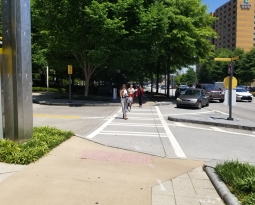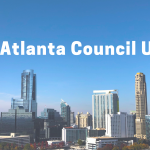Hot Working-Girl Walk: Urban heat and your commute
It’s September and it’s still 90 degrees outside! This past July, members of Atlanta City Council released the city’s first street-scale heat and flood vulnerability assessment. While the study focuses on neighborhoods adjacent to Downtown, several neighborhoods in Buckhead were found to be moderately or highly vulnerable to urban heat and flooding. These moderate to high-risk neighborhoods include major commercial centers in Buckhead such as Lenox and Buckhead Village, where many of Buckhead’s visitors and commuters frequent.
The study focuses on two climate related phenomena that communities can be “vulnerable” to: urban heat and flooding. Flood risk is pretty straightforward, but urban heat may be a new idea to many people. Urban heat, or the urban heat island effect, occurs when cities are much hotter than surrounding suburbs and rural areas. Urban areas heat up because the urban built environment has a lot of concrete and fewer trees compared to surrounding areas. Cities also have more people generating heat with their day-to-day activities, such as driving vehicles and using air conditioning.
You may be thinking, “I drive to work. Who cares if it is hot outside?” Well, urban heat doesn’t just affect you on the way to and from work. It affects how you feel throughout the workday, your office (and personal) energy costs, and even the aesthetic beauty of your work environment. Thermal comfort at or on the way to work can affect an employee’s performance. Humans have a psychological response to heat, and thermal discomfort (a work environment that is too hot or too cold) can lead to decreased worker productivity.
While driving to work in a personal vehicle may be one way to avoid being outside in the heat, commuters may still have to walk from their cars to their offices through a hot parking deck or (even worse!) an unshaded parking lot. Cars also exacerbate the urban heat island effect through vehicle emissions. Large roads and highways that accommodate vehicle traffic also make surrounding neighborhoods hot.
There’s lots of ways to reduce urban heat in your neighborhood or on your commute. You can plant trees in your yard, or see if an organization like Trees Atlanta is offering tree planting opportunities in your neighborhood. You can also drive less and bike/walk/take public transit more often to reduce your personal contribution to urban heat. If you’re commuting in and around Buckhead, consider taking the Buc or riding MARTA to get where you need to go.
Most importantly, prioritize your health and safety as a commuter. It may start cooling off as we are heading into autumn, but next summer is only going to be hotter!








